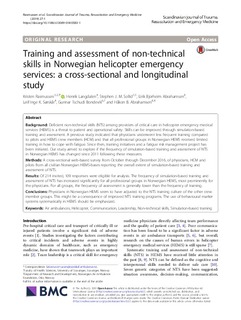| dc.contributor.author | Rasmussen, Kristen | |
| dc.contributor.author | Langdalen, Henrik | |
| dc.contributor.author | Sollid, Stephen J. M. | |
| dc.contributor.author | Abrahamsen, Eirik Bjorheim | |
| dc.contributor.author | Sørskår, Leif Inge Kjærvoll | |
| dc.contributor.author | Bondevik, Gunnar Tschudi | |
| dc.contributor.author | Abrahamsen, Håkon Bjorheim | |
| dc.date.accessioned | 2020-02-10T14:42:11Z | |
| dc.date.available | 2020-02-10T14:42:11Z | |
| dc.date.created | 2019-01-08T19:23:35Z | |
| dc.date.issued | 2019-01 | |
| dc.identifier.citation | Rasmussen, K., Langdalen, H., Sollid, S.J.M. et al. (2019) Training and assessment of non-technical skills in Norwegian helicopter emergency services: a cross-sectional and longitudinal study. Scandinavian Journal of Trauma, Resuscitation and Emergency Medicine, 27, pp. 1-10. | nb_NO |
| dc.identifier.issn | 1757-7241 | |
| dc.identifier.uri | http://hdl.handle.net/11250/2640843 | |
| dc.description.abstract | Background
Deficient non-technical skills (NTS) among providers of critical care in helicopter emergency medical services (HEMS) is a threat to patient and operational safety. Skills can be improved through simulation-based training and assessment. A previous study indicated that physicians underwent less frequent training compared to pilots and HEMS crew members (HCM) and that all professional groups in Norwegian HEMS received limited training in how to cope with fatigue. Since then, training initiatives and a fatigue risk management project has been initiated. Our study aimed to explore if the frequency of simulation-based training and assessment of NTS in Norwegian HEMS has changed since 2011 following these measures.
Methods
A cross-sectional web-based survey from October through December 2016, of physicians, HCM and pilots from all civilian Norwegian HEMS-bases reporting the overall extent of simulation-based training and assessment of NTS.
Results
Of 214 invited, 109 responses were eligible for analysis. The frequency of simulation-based training and assessment of NTS has increased significantly for all professional groups in Norwegian HEMS, most prominently for the physicians. For all groups, the frequency of assessment is generally lower than the frequency of training.
Conclusions
Physicians in Norwegian HEMS seem to have adjusted to the NTS training culture of the other crew member groups. This might be a consequence of improved NTS training programs. The use of behavioural marker systems systematically in HEMS should be emphasized. | nb_NO |
| dc.language.iso | eng | nb_NO |
| dc.publisher | BioMed Central | nb_NO |
| dc.relation.uri | https://sjtrem.biomedcentral.com/articles/10.1186/s13049-018-0583-1 | |
| dc.rights | Navngivelse 4.0 Internasjonal | * |
| dc.rights.uri | http://creativecommons.org/licenses/by/4.0/deed.no | * |
| dc.subject | air ambulance | nb_NO |
| dc.subject | Non Technical Skills | nb_NO |
| dc.subject | simuleringsbasert læring | nb_NO |
| dc.subject | simulation based learning | nb_NO |
| dc.subject | luftambulansen | nb_NO |
| dc.title | Training and assessment of non-technical skills in Norwegian helicopter emergency services: a cross-sectional and longitudinal study | nb_NO |
| dc.type | Journal article | nb_NO |
| dc.type | Peer reviewed | nb_NO |
| dc.description.version | publishedVersion | nb_NO |
| dc.rights.holder | © The Author(s). 2019 | nb_NO |
| dc.subject.nsi | VDP::Medisinske fag: 700 | nb_NO |
| dc.subject.nsi | VDP::Midical sciences: 700 | nb_NO |
| dc.source.pagenumber | 1-10 | nb_NO |
| dc.source.volume | 27 | nb_NO |
| dc.source.journal | Scandinavian Journal of Trauma, Resuscitation and Emergency Medicine | nb_NO |
| dc.identifier.doi | 10.1186/s13049-018-0583-1 | |
| dc.identifier.cristin | 1652794 | |
| dc.relation.project | SHARE - Centre for Resilience in Healthcare: 5091 | nb_NO |
| cristin.unitcode | 217,13,2,0 | |
| cristin.unitcode | 217,8,3,0 | |
| cristin.unitname | Avdeling for kvalitet og helseteknologi | |
| cristin.unitname | Institutt for sikkerhet, økonomi og planlegging | |
| cristin.ispublished | true | |
| cristin.fulltext | original | |
| cristin.qualitycode | 1 | |

